Lisa alert official page on Instagram. What search have you already been on? - What changed
"Lisa Alert"- a search and rescue team consisting of volunteers who search for missing people. Exists since 2010. It conducts large-scale search operations involving volunteers, the media, specialists and online communities. The squad includes dog handlers and trackers, jeepers and ATV riders, aeronauts and divers.
In 2017 alone, according to Lisa Alert statistics, in 2017 the search team received 2,005 calls about missing children. With the participation of the detachment’s volunteers, 1,904 children were found alive, and 79 children were found dead.
“We cannot count how many people entered the forest and how many came out.”
Why "Lisa Alert"
On September 13, 2010, four-year-old Liza Fomkina got lost in the forest in Orekhovo-Zuevo with her aunt. During the first five days, almost no one looked for her, but then information about her disappearance hit the Internet, and volunteers joined the search.
About 500 volunteers took part in the search for the girl, combing forest debris and residential areas meter by meter. However, Lisa died of hypothermia on the ninth day after her disappearance. Her body was found on the tenth day.
This is where “Lisa Alert” began, the name is in honor of the missing girl.
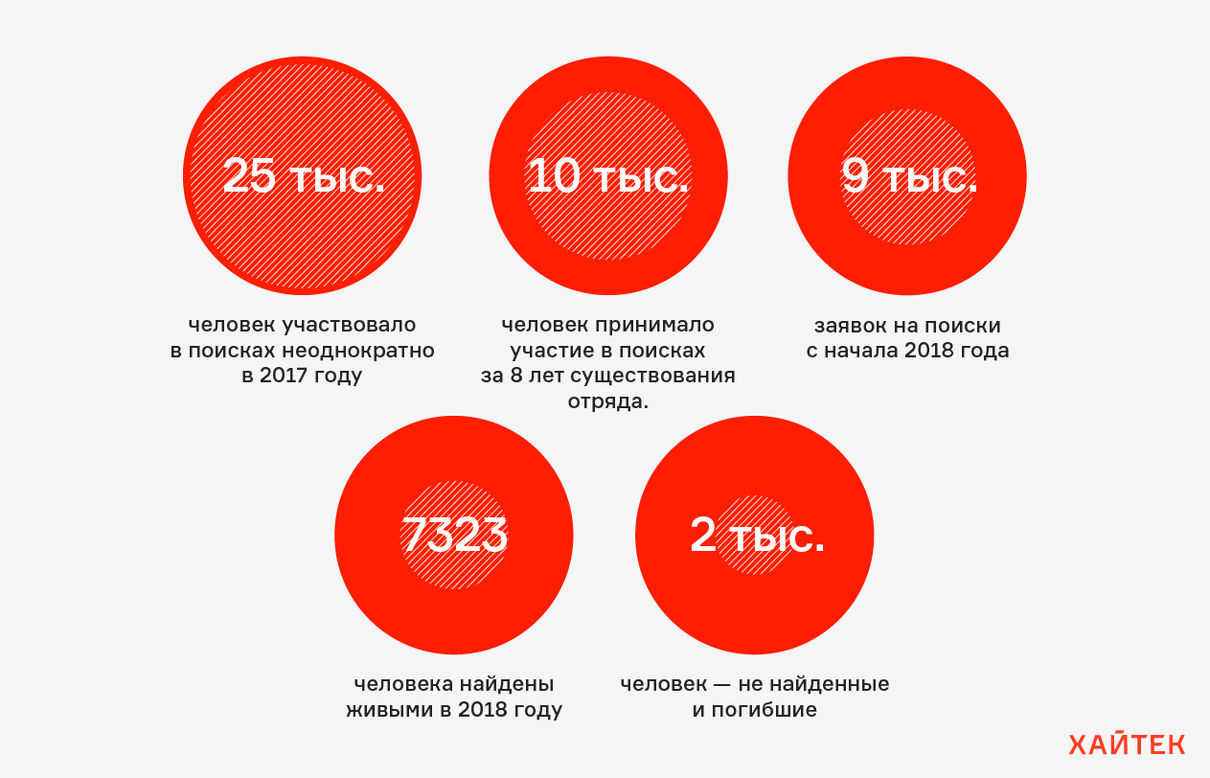
- How many cannot be saved or found and what is the problem?
Last year, in Moscow and the Moscow region alone, we either did not find them at all or found more than 150 people dead. But who knows about this? At the same time, from mushroom poisoning, which everyone talks about, at the very terrible year two people died (we don’t know what this figure is for Russia).

Smart cities put their residents at risk due to light and radiation sensors
Technologies
The Leningrad region is currently being rained on, and many mushroom pickers are getting lost there every day. There was no rain in the Moscow region, it was a wonderful dry summer, there were very few mushrooms and berries in July, so it was a very low season compared to last year. But when the honey mushrooms begin, if you somehow go to the region, you will see a lot of parked cars on the side of the road. If the car is still there at night, it means that people have not left the forest. But most often these are mushroom pickers not in cars, but from a gardening partnership, those who arrived by train or bus.
“We walk with lanterns - it’s great that we don’t have torches”
- What technical solutions do you use?
When we first started, we didn’t understand what tools to use and what technology to use, so we reinvented the wheel. It looks like this: groups travel with ordinary tourist navigators and when they return to headquarters, the data from their navigators is merged onto the search map. The map is marked with squares of 500 by 500 m and allows you to see what is happening, the quality with which the group worked, and what areas it covered.
There is the most reliable basic device with a long history - the compass. It doesn't even need batteries, which is... modern man looks amazing.
Now we are actively using small aircraft - helicopters - and are starting to work with drones.

We walk with lanterns - yes, it’s great that they are not torches, but the difference between them is not that significant. On the other hand, even using such an item as LED lights already allows half of everyone we find to be seen in dark time days. Typically, many services stop search activities at night because it is ineffective and dangerous. And we have minimal statistics on injuries at night and maximum statistics on finding people. Simply thanks to good flashlights with low current consumption and high light output.
- Can a thermal imager be used on a helicopter or drone?
The thermal imager does not see under the treetops. It may come in handy in the field. Just not at +25°C in the sun, when the grass will glow like a person. And in order to detect a person wrapped in clothes in winter, you need a very expensive thermal imager with a cool matrix.
- Do you work additionally in the city with cameras?
Yes, in any city we try to use all the systems that are available. But there is a big problem with access and quality of recordings and with the lack of cameras. Even in Moscow, with more than 180 thousand installed devices, to fully support search activities, I would like to increase their number by three.
- How do you apply these solutions? What is the efficiency?
The helicopter is used so that a person can point at himself - if he is in touch with a phone that has not yet been turned off. Now this is done by volunteers - the Angel helicopter volunteer search and rescue team helps us.

Photo: Anton Karliner / Hi-Tech
While helicopters help a lot in searches, the effectiveness of drones is not yet very high. Out of a hundred applications, people were found three times. But drones help take photos and videos, create a real-time map to update terrain data.
We also have a well-developed initiative - a crowdsourcing project. The drone flies over a square of 500 by 500 m and takes about 600 photographs from a height of 40 m. If we look at them at the search headquarters, then we need a lot of people - after 40 minutes the eye becomes blurred, and after two hours a person becomes completely ineffective.
We empirically came to the conclusion that these should be photographs, but not videos - we skip everything on the video. We created a resource on the Internet where we post cut-up photographs and people look at them. This way, volunteers can search while at home. We spotted this technology from rescuers who work in the Carpathians. They have been doing this for many years, and we have made the same resource and hope that it will be effective and useful.

Living smarter: how to protect your home and not be afraid of cyber threats
Technologies
Now we are using bypass technologies - we are looking for something that will help us search for a person on foot and with flashlights.
“Our state, under the auspices of data preservation, prohibits finding directions on the device”
- Tell us about cases when drones helped find people.
The low effectiveness of drones as a technology is due to several factors. Firstly, flight time. Secondly, the cost: if we want the special properties of the device, its cost becomes frightening. The bottom line is that finding people using drones is a huge problem.
For the first time we found a person from a drone in Rostov region in winter. A man who walks poorly has gone into the field. It took several hours.
The second time we checked the evidence, the site was easiest to inspect from a drone. The man was discovered.
For the third time, a person could be anywhere - these are the Shatura forests. He was in touch for at least a day, but the law does not allow direction finding on a mobile phone. We launched a search campaign, which was unsuccessful. Thanks to the persistence of the search coordinator - and we searched for the man for two weeks - he was discovered from a drone. Unfortunately, they died. But the man was discovered - how the technology worked.
- How do you use direction finding, smartphone data?
In Poland and the USA, people are searched using mobile data. It’s enough to drive around the forest, find the device’s direction and pick up the person, without sending 27 people into the thicket. Our state, under the auspices of data preservation, prohibits direction finding of a device.
We have been lobbying for a long time for the ability for the 112 service to receive location data. Before man after the accident they asked which kilometer post he had passed. Now 112 receives the location of the caller, but with a large error. If in the city it is plus or minus 400 m, then in the forest it is 2 km. Low positioning accuracy does not make it possible to use it for searching.
Technically, GSM helps to determine the position of a person. The emitter at the base station is able to approximately determine how far a person is from it, and three such emitters give an approximate location. Even if there were two emitters, we could narrow the search perimeter and get some chance in the form of a sector 550 m wide and 2 km long, but now we don’t even have that.
“The device tells where a person is. We'll go and get him."
- What tools do search engines need most today?
Now, on average, 27 people participate in each search in the Moscow region, with two in one, and 80 in the second. This is catastrophically small. To comb a 500 by 500 m square on foot in an ordinary forest near Moscow, assuming that a person can lie down and not respond, we will need four to five people for eight hours with good training, in the right clothes. In this square they will leave approximately daily norm calories. Not every person can do this physically difficult work for eight hours. Moreover, during a standard search we have from 20 to 50 such squares. We will never comb through them, we will not have enough people.
Of the 27 people, three organize the search, the rest work in the forest. 24 people explore five squares and go home or to work tired. On the weekend they can go home, sleep and start searching again.
"We need to reduce the need for large quantities people while searching. It’s nice to imagine this picture: the four of us arrived in a minibus and are eating hot dogs, and then the device tells us where the person is. We go and get him. Such a solution would help us a lot."
Now, despite the demand for such solutions, many people get lost, for example, near the equator - due to the lack of search technologies. Euronews once showed how a man got out of a helicopter in Belgium over a forest and the police said it was suicide. At the same time, it is impossible to find the body: “The man fell into the forest. How can I find him? And we find, but we find with our feet.
- How do they look for people in other countries? Can experience and technology be used in Russian realities?
Inside "Lisa Alert" there is unique experience, and we are trying to study what other countries have.
Rescue teams around the world accumulate experience and publish it in the form of manuals. But among the data that they write there, for example, there is the following parameter: a child of five years old must be searched within a radius of 1.9 km from the place of disappearance, and this indicator is the same for both England and Australia. But it’s rare in our country that a five-year-old child won’t run 5 km. In addition, parents spend an average of three hours hoping that the child is with neighbors or walking in another yard, so they do not report the loss anywhere.

“Someone controls my house”: how victims of domestic violence are terrorized using smart devices
Technologies
Globally, many problems can be eliminated if people are taught to use gadgets. The Canadian mushroom picker has a button that allows you to call a helicopter. An insurance rate is payable to use the device. I can hardly imagine how we will transfer this to Russian reality, how we will issue such devices to grandmothers and young people.
In Yakutia, people freeze every year. A helicopter can pick them up, but there is no connection there. There are two solutions: either frequently and expensively fly a helicopter into the air and monitor the entire road, or rent out such devices to everyone at the entrance to the highway and pick it up at the exit. All satellite operators have such satellite signaling devices.
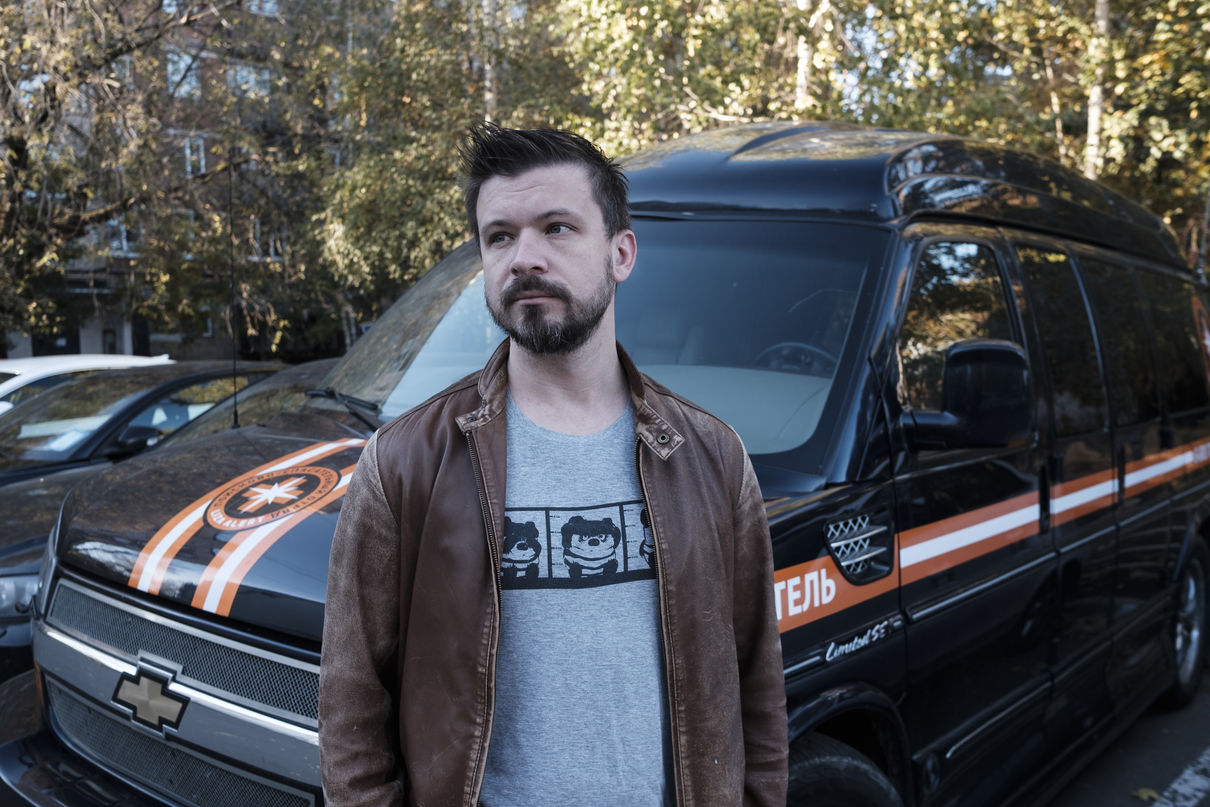
Photo: Anton Karliner / Hi-Tech
Fortunately, the attitude towards human life in the metropolis is beginning to change. We see how everything more people started going into the forest with mobile phones.
“We need a solution that allows us to find a person within a radius of at least 10 km in less than ten hours.”
If we talk about gadgets like children's watches, they were originally designed to see where the child is. How do they work in practice? And what should I use for older people?
There are many problems with their use. Not all devices show the location adequately. You need to look at which card their data is linked to. And if the child’s mother and father can figure them out, then what will the grandmother do? You need an easy-to-use, well-thought-out device, but then it won’t cost 1,500 rubles. In any case, such gadgets usually end up at home after six months.
If we talk about the elderly, 83-year-olds suffer from Alzheimer's disease in 70% of cases. They may leave home and never return. In Denmark, these people are “ringed” with bracelets, everyone knows where they are. In Spain, this bracelet does not have GPS, but it has a specific color and a QR code with all the information about the person. We need GPS bracelets that last a long time, are cute, but cannot be removed. This is a headache for the state. And what we are now discussing in the format research project"Odyssey" charitable foundation“System” is much less of a fantasy. The main objective of this project is to offer a technological solution that allows you to find a person lost in a forest area without a communication source within a radius of at least 10 km in less than ten hours, in any weather and at any time of day. Let's hope that the Odyssey participants will offer efficient technologies search or device.
In Russia, there is a shortage of such gadgets for the “old people” and “children” categories of the population. What is needed is a device that is fairly simple and, on the other hand, provides location control so that a problem can be reported from it. We have not yet seen or known such an ideal device. A mobile phone often saves a person's life in a situation where he is lost, but it must always be charged.
- Tell us about cases when such devices helped find people.
We have never received an application for a child who has a child's watch on his wrist. They found an old woman with memory loss, and relatives called the detachment and reported her approximate location.
Gadgets - the history of the future.
In 2015, a person disappeared in the Moscow region, they searched for five days and found him. He was without a phone; volunteers advised his relatives to buy a phone. Last year, the same person got lost with his cell phone. They searched for seven days and found him dead.
"Odyssey" and "Life Button"
- What do you think about the “Life Button” project?
This is a great concept. But having a device connected to a call center is not enough. Russia is different, there are many different services operating there, their competencies differ from city to city.
The service that is responsible for this device must be able to report information to the necessary authorities.
- Are mobile operator services designed to monitor children’s devices effective?
This is very useful thing. It is important that they get location frequently because children move very quickly. Then they launched on full power, will be useful.
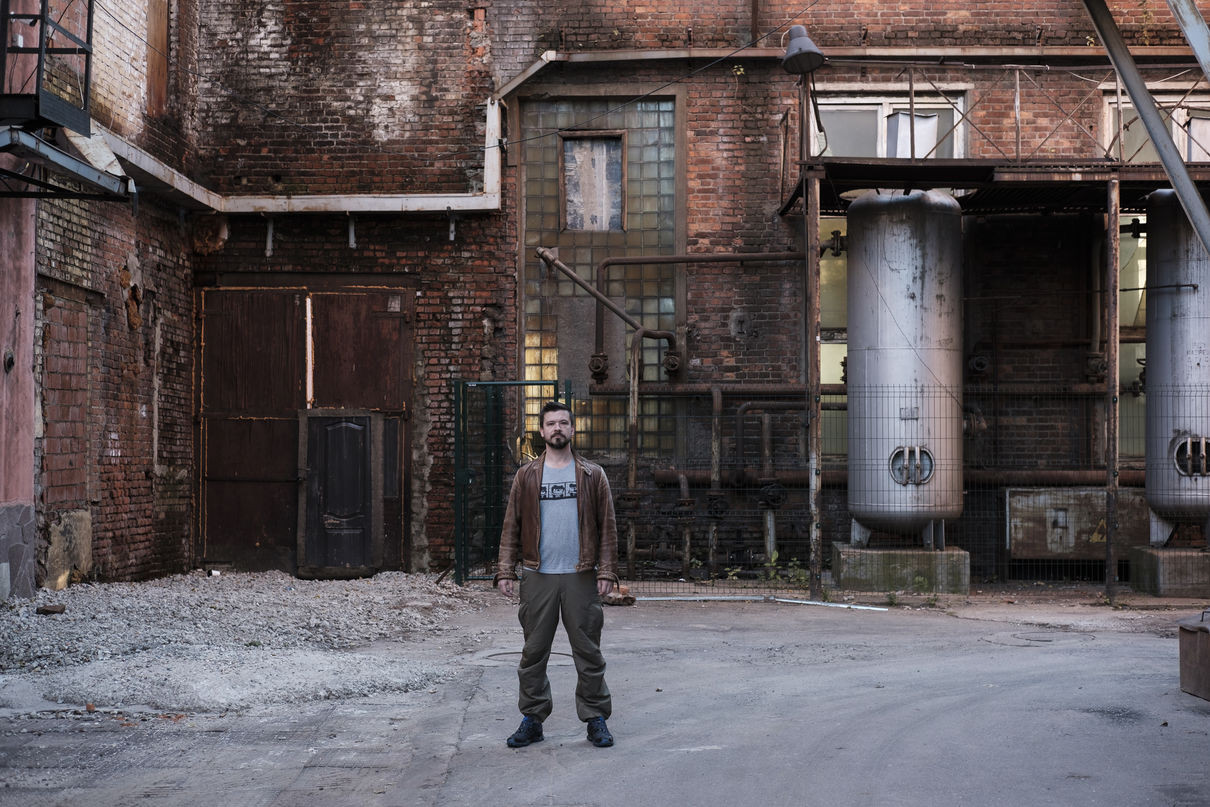
Photo: Anton Karliner / Hi-Tech
You are an expert in Project Odyssey, a competition to create next-generation search and rescue technologies. What results do you expect?
I expect that bright minds will take part in the competition, which will provide an opportunity to use technology differently and use less people. As a person who sits on the edge of the forest and organizes search events, I want everything at once.
Now it is difficult to imagine what technologies will be developed or how existing ones will be applied. But there can be many options. For example, scientists from MIPT told me: the electronic nose that Opportunity has on Mars can smell a millionth of a gram of a substance. In theory, it is much easier to smell a person in the forest. But you need to want to make this technology, want to work it out, spend an insane amount of money to launch it.
First of all, technology should not be associated with a mobile phone, because many people either have it dead or don’t have one at all. We need technology that will find a person under the treetops. The smaller it is, the cheaper, the better. It can take two KamAZ trucks, but due to the cost, we could put such equipment in every city, or it should be the size of a suitcase so that a person can fly with it to any region.
If the solutions obtained are effective and interesting public services, then those who develop them will be able to receive adequate funding. If the technologies are tested in Russia and show their effectiveness, it will be important achievement on a global scale, because the problem of missing people exists in every country.
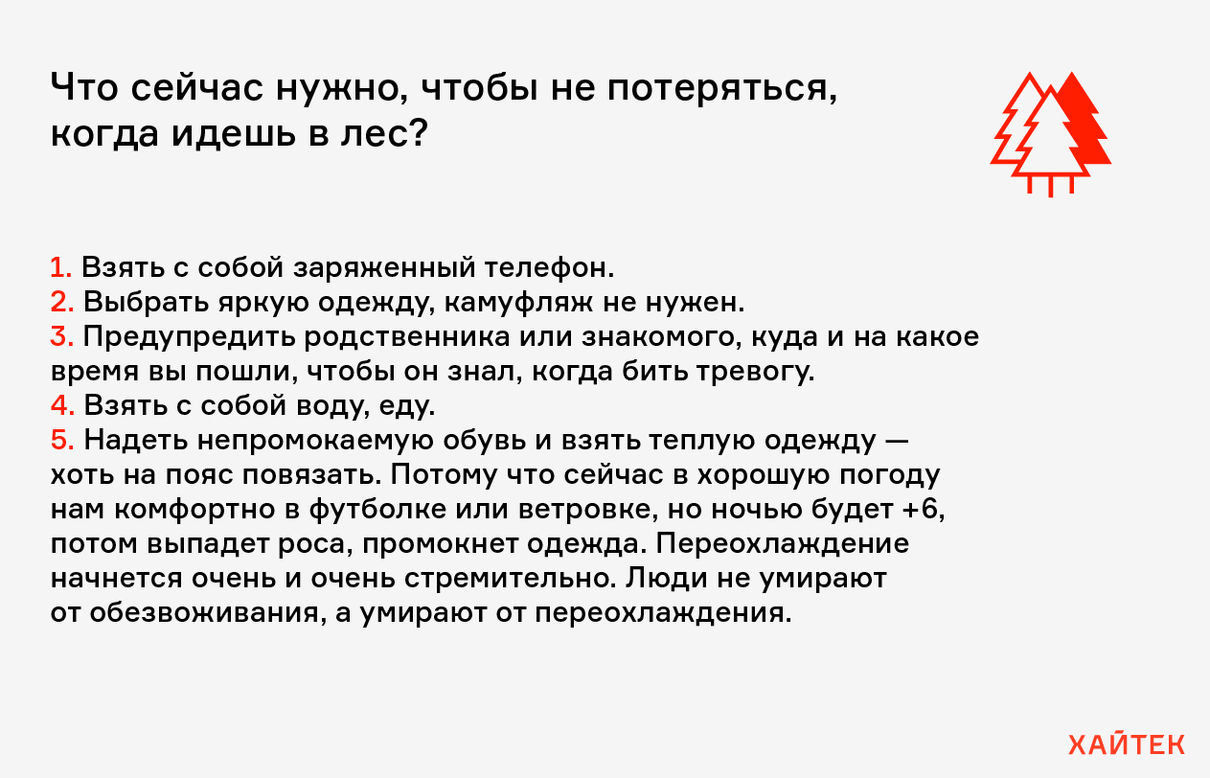
The ideal mushroom picker took a compass with him and he knows how to use it. Before entering the forest, he took a linear landmark. He has a navigator and a push-button telephone with him - with a smartphone it may turn out that there was a lot of Facebook in the forest, but the map no longer opens.
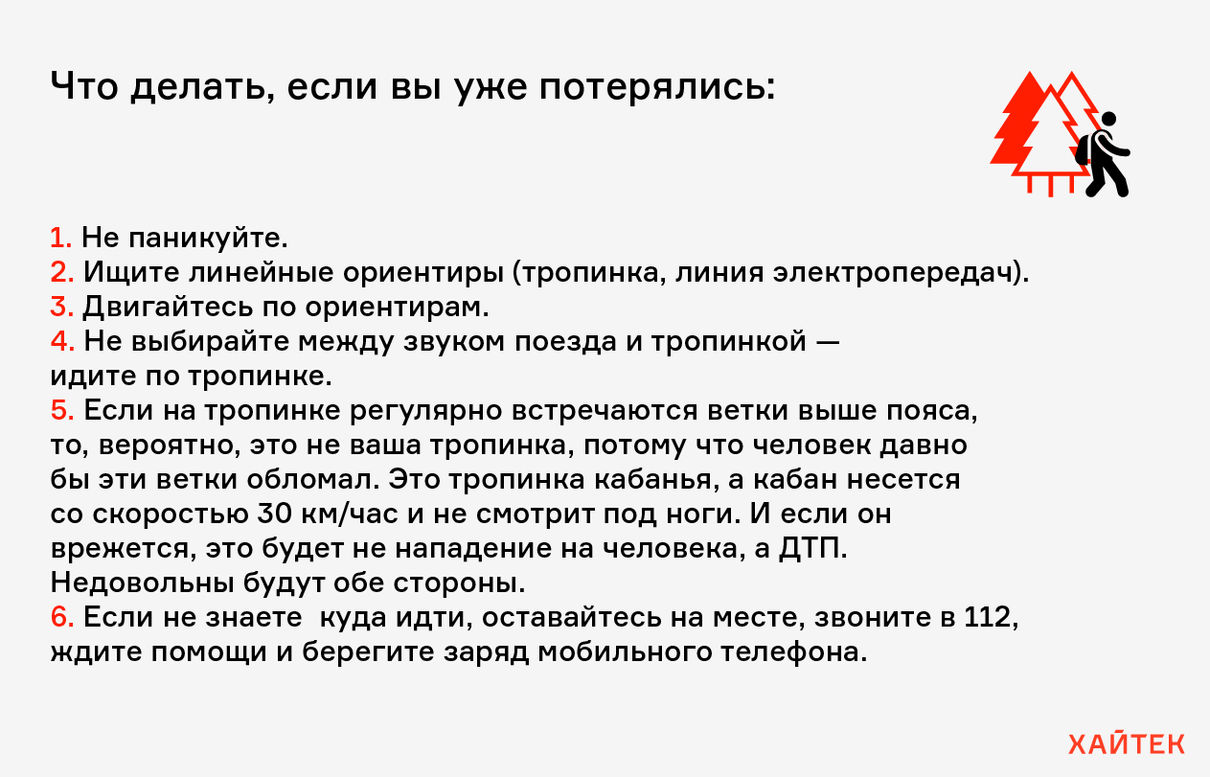
- And one more personal question for me, as for the father of a four-year-old girl. How to explain to a child what to do?
Soon you can go to the Lisa Alert security school. We hold them about once a month, and up to 350 children participate.
The main technology is that a child should not be afraid to tell something to his parents, or be afraid to scream. After all, everywhere and always he is forbidden to shout - in the cinema you need to sit quietly, grandma is sleeping - keep quiet. He must be able to yell, gather those who are worried around him, stand and wait.
Fortunately, most of applications for missing children - this is when they went against the rules, did not wait for their parents, went home and stood waiting outside the apartment until the door was opened for them.
Volunteers of the Lisa Alert search and rescue team have helped find more than 20 thousand people alive over seven years. Even more could have been saved if more people had helped the squad. To make becoming a volunteer as easy as possible, Beeline launched a new search. BigPiccia interviewed three volunteers subscribed to the mailing list about their first experience of helping the squad.
Alexander Ovchinnikov: “I used to look for the dead, but now I’m looking for the living”

I signed up for the newsletter about a month ago. The first time I received an SMS that a woman had disappeared near my dacha, but I had already left there. And the second time a man disappeared on the street next to me, already in the city, and I decided to go. But in general I signed up for searches throughout Moscow, so it coincided by chance. Previously, I was looking for those killed during World War II in different regions of Russia, but now I decided to take part in the search for living people.
How did the search go?
There were several carriages in cars, they gave us a map of places where grandmother could go: Izmailovskaya Church, a store next to the house. Her son said that he didn’t find the keys to the dacha at home, but she would hardly be able to go there: she has Alzheimer’s disease, and he has been taking her to the dacha himself for a long time.
Did volunteers also work at the dacha?
No, the coordinators called the watchman and found out that she was not there.

Was the real search different from your ideas about it?
No, it wasn’t different, before that I watched a video from the search for “Lisa Alert” on YouTube, went to a training event at the Beeline office where I work, it was interesting to watch. They told us how to protect a child from going missing.
Did you tell your children?
My child is still small, he is five years old, but there was information on how, for example, to gather children in the forest. You should not dress in green or brown, because a volunteer may walk a few meters from a lost person and not notice him. Then if man walking to the forest, he must have some Snickers with him.
If a person has disappeared, there is no need to call him, you are unlikely to be able to help him. You ask: “Where are you?”, He will say: “I’m in the forest.” That's it, you can't do anything about it. Therefore, you need to call not him, but the police, the Ministry of Emergency Situations. It is believed that a missing person report is accepted within three days. This is a big misconception: the police in Russia are required to accept a statement on the first day.

Will you still go searching?
I'll try, it depends on the time and how close it is to me. I think yes, it's interesting.
Have you told your friends about them?
Of course, family, loved ones, relatives. Shared photos on Facebook. Basically they wrote: “Well done, great,” but maybe someone would want to come. I attracted some attention to the detachment.
Mikhail Semenov: “I receive more than I give”

I probably learned about Lisa Alert from social networks; there were constant reposts with information about missing people. Then I went to the forum and studied the search methodology in more depth. I studied as a student sports tourism, we went together to some Kyrgyzstan and rafted down the rivers on catamarans for a month. It was such an experience of communicating with the forest; non-standard situations did not frighten us at all. Therefore, I am familiar with maps, equipment, walking in azimuth, and so on.
What role have you chosen for yourself in the squad?
Walking search engine. There are very different professions there, and each person can help. This includes cartography, mailings, reposts, the call group is very active and effective: it can find people without going outside.
How did you go from reading the forum to actively searching?
I was on topic, but there was no motive to take action. The motive was the search for Artem Kuznetsov in the Lipetsk region.
Why him?
(Pause.) The child is small, three years old. He, his father and sister came to make hay. Artem wanted to play hide and seek, but his sister didn’t want to, so he ran away from her. They couldn't find him for a very long time. This was a high-profile search, when a lot of people are involved and use the media. I found out about him through social networks, and began to blame it on myself: I have children. I’m talking about this now, and there’s a lump in my throat. It was impossible to pass by.

The boy was never found. He spent about four days alone in the forest and eventually died from dehydration.
What are your memories of the search for Artem? It must have been very difficult emotionally?
Yes, definitely. When there is a long distance to the search area, people cooperate and ride in a carriage with someone else. We drove there for six hours and another six hours back, and during this time I was given such a course as a young fighter. I found myself in an interesting crew - with one of the most experienced search engines and with a representative of the Lisa Alert PR service. We talked about everything: about the specifics of the search, about experience, about different situations. For me it was such an introductory theoretical course.
We had not arrived literally ten minutes when information came about stopping the search. It often happens that you don’t reach the search and get rejected. Artem was found dead. First they found his sandal and the place where he spent the night, and then he himself. The canine dog found it, if I'm not mistaken.
Do such stories demotivate or, on the contrary, encourage more participation and attract people?
When you talk to people about memorable searches, everyone says: the ones we remember are the ones we didn't find. The analysis of where things went wrong begins. This is absolute mathematics, everything can be calculated: on average, a child is located five kilometers in diameter from the place of disappearance. This is an area of 20 square kilometers. It takes so many people to close them. One team covers such and such territory. That is, we can calculate: with our resources, we could have found it, but we didn’t find it.
At that time we really lacked people. We drove up and saw that local residents were working in haymaking. We wondered: how can people live and exist when this happens nearby? Locals They knew about the search, but did not go out, for some reason they thought that the father was guilty and the death was violent. The poor father was then persecuted, he answered the polygraph.

And only when they found this child’s shoes did they start sending state employees out to search... The governor helped us a lot, additionally providing about four to five hundred police officers and civil servants for the search.
Was this done quickly?
No, unfortunately it took a long time. We didn’t have time, which means it wasn’t efficient. This was already on the fifth day of the search, when the child spent five nights alone in the forest.
How many people did it take to find him?
I can’t say for sure, but off the top of my head it’s around 2000 people.

Note from BigPicchi. During the search for Artem Kuznetsov, the volunteers were greatly helped by a mobile base station (pictured), which Beeline brought to Lipetsk from Moscow. Thanks to it, it became possible to synchronize maps, coordinate better and work faster, which is very important for searches.
This was my first search, but not my only one. Now I am subscribed to all searches in Moscow and the Moscow region. On the eve of the summer season, when many people get lost in the forest, I participate in urban searches. Anyone can help, it doesn’t have to be a person with sports experience like me, with equipment, free time. My latest experience was searching for an adult man: 33 years old, disabled, disoriented. He and his father were riding bicycles in Meshchersky Park, he got scared of the dog and rode off in an unknown direction.
They could not find him for four days. He couldn’t call for help, and people don’t react to such lost people. TO small child They will be suitable if the grandmother is sitting alone at the bus stop in the evening - they will also help, but he looks like an adult man, so he does not attract attention.
Then I worked on the task of stations. It was necessary to conduct a survey, make a posting and communicate with the line police departments in the Belarusian and Kiev directions. The task was to interview, so to speak, the residents of the station, visually inspect whether there were people who looked like the lost one, paste over our stands with landmarks and interview the police whether there had been any incidents with similar people: with men of the same age and, for example, with a bicycle.

I was amazed that in the Kiev direction all the employees of, let’s say, “Lisa Alert” are friendly. They immediately said: let’s leave the orientation and we’ll take a look. The duty officer at the police department immediately radioed to all employees of the department that a search was underway, ordered everyone to report to the duty station, distributed a photo of the missing person, and everyone took a photo of him. It was very prompt and without words at all, automatically.
The work took me two hours, I printed out 20 guidelines and posted them up, covering a large part of the search. Even if you walk for several days and don’t find a person, this is not a reason to be upset; on the contrary, you should be proud, because you have narrowed the search area. This means that it is not here, you need to concentrate on other places. This is about the question of motivation.
I understand that you calmly combine your search with family and work?
Yes, I have two children, my daughter is one and a half years old, my son is three and a half years old, I have a job - I am a sales manager at the Beeline company. Of course, there’s not much time, but spending two hours after work is really important matter connected with people's lives is not so much.
I know volunteers who go out searching two or three times a month and combine this with work and business. Anyone can help, the more people the better. Someone can print out directions, someone can take them to the headquarters near the metro, someone can take searchers in a free car to the forest or city search.

One of my motivations is this: I currently don’t have the opportunity to fully go hiking. I tried to hunt, but I feel sorry for animals, and I couldn’t. And searching is communication with nature, physical activity and, if this doesn’t sound cynical, it’s also a kind of hunt. Such an unusual hobby. I probably get more than I give.
Do you encourage your family and friends to participate?
Yes, I'm subversive in many places (laughs). Without fanaticism, of course: you cannot force a person. There are simply people who cannot ignore the problem. I analyzed why I was doing this: I can’t pass by a crying child if he’s alone, I can’t help but help carry a bag to the subway. Some people have such upbringing and a sense of responsibility, others do not. Probably, you can’t blame or reproach anyone. I tell the tourism guys about the search, and we sometimes go together.
Igor: “Someone has to do it. I must"

I recently learned about Lisa Alert, went to the site and subscribed to the newsletter.
What search have you already been on?
We walked around the city with a friend, I invited him. In St. Petersburg. I don't have any special impressions. Probably someone should do this - so I should do it. My friend, who completely agrees with me, did this too. That's the whole principle. Our police, even in 2018, are of no use.
Do you encourage your family and friends to participate in the search?
No, I’m not egging anyone on, I’m not putting together any team. It’s just that if I see among my loved ones a person who agrees with me, coincides with me in the vision of this problem, then I’ll simply offer him, and he will 100% take it and go, as happened with mine best friend. I just told him: “Let’s go,” he agreed, and it was night. We got into the car and drove off.

Have you been looking for a long time?
(Turning to a friend.) How long did we walk, Ruslan? Four, five hours.
Found it?
No, the person was not found.
Will you still travel? At night?
It doesn’t matter, there will be time - I’ll go right away, that’s all. Of course I will. It doesn’t matter to me where I go, I have a car, I’ll take it and go anywhere.
How to become a volunteer
To quickly learn about new searches in your area, sign up for a free SMS newsletter from Lisa Alert about searches near you. The newsletter is free and available to subscribers of Beeline, Megafon, MTS and Tele-2.
Any help in the search is important: calling hospitals, printing and posting directions, interviewing witnesses, interacting with relatives and the police, the opportunity to take people on foot to search or take part in the search itself. search operation. In the summer there will be a lot of searches, and there are always not enough people. Everyone is truly important to us.
Friends, fellow search engines, media representatives and everyone,
who is not indifferent to the problem of missing children!
It is known that many children disappear every year. We will not cite boring statistics that only the lazy did not quote. What is clear is that now there are truly enormous resources for the rapid search for lost people, thanks to several search and rescue teams that have been formed. But these resources have become difficult to use, because the struggle for the right to be considered “main”, “largest”, “most popular” search party in Moscow and the region is already crossing all boundaries. People forget about the goal when entering into the struggle for leadership, which discredits the very idea of a volunteer movement to find children. For a long time we did not participate in the general debate, considering it unworthy and frivolous for adults. But recent events simply force an answer. To begin with, I would like to tell you how it all began...
And it all began in the forests near Chernogolovka, in June 2010, where many of us ended up by accident. On the auto forum, Yulia (Taiga) made a call for help in finding a 4-year-old boy. The search continued almost around the clock, for 4 days. Then they were lucky and Sasha was found alive. Video: Sasha sits in the arms of Alexander Efimov (YoFA), it was he who discovered him. Pavel Filippovich (Pavel, Rasp) is also seen contacting headquarters to report the situation. In total, more than 500 people took part in those searches. It is difficult to imagine the joy of the searchers when this news arrived, and the feeling with which they returned home. It was then, for the first time, that attempts were made to rally the volunteers into a single unit, but the idea was not crowned with success.
In September, after the terrible fires had burned out and the dense forest had become completely impassable due to rubble, information arrived that 5-year-old Liza Fomkina and her aunt had disappeared in Orekhovo-Zuevo. Active searches They started when several days had already passed, but the warm weather offered a chance for salvation. Pavel Filippovich (Pavel, Rasp) undertook to coordinate the search. For almost a week, he, together with Maxim (a teammate at the auto forum) and Maria (a family friend) coordinated more than 300 volunteers who worked together with the police and military. They looked for the girl and aunt throughout the city, in the surrounding villages, in abandoned basements and houses, in endless forests and swamps, and even in neighboring cities. The entire Internet was, figuratively speaking, “on the ears.” Little Lisa was discussed on forums and blogs, social media and psychics.
Communities of all-terrain vehicles, ATVs, dog handlers, a forum for ferret lovers and other thematic resources broadcast information about the progress of the search around the clock, helped with notifications and attracted the media for this. There was only one goal - to notify as many people as possible so that they would come and search. Those who searched in Chernogolovka also arrived and, of course, there were many new volunteers - among them Dmitry (Koleso), who searched at night and returned to the office in Moscow in the morning, and Alexander, the head of a detachment of volunteer firefighters, Dmitry Volkov came with him (bayaga), who extinguished forest fires in the area before the search (he is now the head of the PSO " polar Star") and Dmitry Lobanov (Okhotnik, Dmitry) with the dog - they were the ones who found the traces of Lisa and her aunt, Masha, and friends, professional rescuers two Igors (Igor-73 and Igor - 107) and many, many, many others! It is simply impossible to list them all! Several hundred caring people who abandoned their everyday life and rushed to the Moscow suburbs. The auto forum, where Pavel described the chronology of events and attracted volunteers, collapsed from the number of visitors. The well-known LJ wwwHYPERLINK "http://www.13sep2010.livejournal.com/".13sep2010.livejournal.com was opened, where about 20,000 people from all over the world visited per day globe. Lisa and Masha were found too late. But that gigantic resonance, those mistakes and conclusions that were made after the search left no other options except the creation of a professional volunteer search team.
It became clear that one of the reasons for the failure of the search was the delay in receiving operational information about the disappearance of children, the disorganization and unpreparedness of volunteers. The newly formed detachment was called upon to undertake the training of volunteers, conducting training, and coordinating searches. Moreover, a team of volunteers has formed who have gained enough experience in conducting search operations. And under pressure from the public and volunteers, Pavel Filippovich (Pavel, Rasp), it was he, and not Grigory Sergeev (Grigoriy) and no one else, who created the “Lisa ALERT” detachment. LiveJournal 13Sep2010 a cry was raised to recruit volunteers for the detachment. Several hundred responses came in, including many who took an active part in the search. Even representatives of show business and government responded. Of course, there were those who joined in the general wave, many simply sympathizers and “onlookers.” The fact that they left over time was not a surprise, it always was and will be so. But, the more dear to us has become that time-tested and experience-tested backbone that continues what it started. So, in memory and thanks to the little girl, the Lisa ALERT detachment arose.
Late autumn and winter is a search lull. There are fewer walks in the forest, less getting lost - an excellent time for training and exercises. Groups were created in certain areas of search, an action plan was drawn up and general fees of all volunteers, in order to develop a unified strategy and the governing body of the detachment - the Council. Large squad-wide exercises were conducted, with the participation of all-terrain vehicles and foot search engines.
In February 2011, the detachment had to go through difficult times. The administrators of the resource (www.lizaalert.org), led by businessman Grigory Sergeev (Grigoriy), who were recruited on a voluntary basis, decided to remove the Council from managing the detachment and begin to manage the detachment independently. Dishonest methods were used: they limited the ability of the detachment leadership and volunteers who disagreed with the administrators to communicate on the forum, disabled personal messages, banned them by IP address, attracted people who had nothing to do with the detachment and never participated in the search. In order to disrupt the general meeting, photocopies of powers of attorney were presented, including from people who had never taken part in the activities of the detachment. Who were these people? And how were such actions supposed to help search for children? Information about the training was deleted, and an entertaining meeting at the recreation center was scheduled for the same date. Slander was spread against the leadership of the detachment, and new volunteers who sincerely did not understand anything and asked fair questions to the admins on the forum most often received a ban. Meetings were held in secret from the rest of the squad members, which were passed off as general meeting squad. When the detachment’s leadership demanded that the administrators resign, he was simply disconnected from the forum. Soon, in a close circle, they gathered initiative group forum and proclaimed herself the leader of the detachment. These people did not ask anyone registered on the forum, did not look at the key searchers who did so much for the formation of the detachment. The main activity on the resource now is to attract as many more people, which is not difficult to do, given the number of interviews they give out in the media, using the well-known and honest name of the detachment. By participating in the search, they misinform everyone, for example: the parents of Sasha Stepanov, who disappeared in May in the Mozhaisk region, are sure that he was found by a certain volunteer GriHYPERLINK "http://www.rutv.ru/video.html?tvpreg_id=151120&vid=119500&mid=14&d= 0&p=1"sha, read Grigory Sergeev (Grigoriy), (43 minutes), although it is known for certain and reflected in the investigative documents that the boy was found by huntsman A. Lebedev, who is not related to the search groups. Lately Accusations began to be heard against us, the organizers of the “Lisa ALERT” detachment, that we were interfering with the site administrators in their, as they say, “ common cause" Of course, we interfere J We don’t give out interviews, we don’t attract the media for self-PR, we don’t conduct demonstration training in front of cameras, we don’t wave flags and we don’t take credit for information about the happy return of a lost animal to the family, but in fact we organize training and training. It’s more difficult for them, knowing that the “Lisa ALERT” squad exists, like entity and the community of search engine professionals, and not as an Internet forum that accumulates caring people around itself, and cannot use this huge human resource due to the lack of clear and professional organization. It became more difficult for them to appear on television, give interviews in newspapers and magazines, telling how they organized the detachment. Because they didn’t organize it, and this is increasingly coming to the surface. Even more strange is that these people consider themselves entitled to give us instructions and accuse us of registering a detachment, which was publicly announced last fall.
Don't believe what's written here is true? Try asking awkward questions on the lizaalert.org forum and look at the reaction. To begin with, within 24 hours your registration will be reviewed and checked to see if you are worthy to communicate on the “volunteer” forum; information about this is posted on the forum. Your question will most likely be erased, and you yourself will be banned or put under pre-moderation. Read old forum topics, for example, the “Activities” section, pay attention to the nicknames of the people who read here. Are we “a squad that exists only on paper”? But it was we who organized the aircraft, as everyone testifies early themes created on the forum. The authors of the initiatives conducted and conduct training and lead a real detachment. Only these people are no longer on the site. Moreover, not on their initiative. Try it, there is little time left - what if you have time to read these topics before they end up in a section that is closed to ordinary users?
But the ambitions of such “volunteers” as Grigory Sergeev (Grigoriy) will not stop us in achieving our initial goals and objectives. The team's work will continue. We will conduct training, training, and participate in searches. That's what we've been doing all this year. Despite everything, we are still confident that strength and results are not in quantity and “loudness,” but in quality. We had no intention of getting into a public spat with these people, but the sudden onslaught of accusations from them forced us to tell the truth. And, we remain confident that no matter what the squad is called, the result of its work and the professionalism of the search engines are much more important, and not the number of publications and interviews in the media. We encourage all volunteers to strive for this.
Sincerely, leaders of the MoOO "PSO "Liza ALERT"
Pavel Filippovich
Dmitry Lobanov
Stanislav Shakel
⠀ “March 7th. Evening. ⠀ Evening application, two girls 11 years old, Podolsk. Moscow is on the eve of the Women's New Year. Headquarters at 22:30 in Mak in Podolsk in the parking lot. Inforg Maria collects travel, equipment, orientation, surveys. Interaction with the police. As a result, we have several anchor points, the girls can be in the shopping center, in a couple of other places, in the entrances and at friends’ houses. ⠀ Next are 26 tasks for which 75 people were sent, lack of equipment. We receive a tasty certificate from a concerned citizen, Inforg double-checks it, passes the certificate to the police, since the certificate can be brought to the apartment, check and that’s it - found alive). By this time it was one in the morning, there were 89 registered search participants. At 1:40 on March 8, everyone returned to headquarters, the search was completed. Thanks to all participants. I even managed to train one participant in the coordinator course.”
Grigory Sergeev, chairman of the detachment: ⠀ “The Yarovaya bill has passed the first reading, in which it becomes possible to determine the location mobile phone without trial. But only for children. ⠀ If it’s not a child who’s missing, don’t give it a chance. Why such injustice is unclear. Meanwhile, many adults with mobile phones get lost and die. I will now give the figures that are known to the LA detachment; these are the searches that we conducted and where we did not save the person. And these are not children. These are adults with a mobile phone. ⠀ I approached the president with this problem in July 2017. The dead were counted from the moment of this meeting until the end of 2018 - there were 70 of them. Seventy lives that could not have been interrupted. For the average person to understand, these are people who could be found at the click of a button. ⠀ As a last resort, if it is not possible to establish the situation through the networks, well, give us what rescuers use around the world. There are such things - virtual base stations that can be placed on the back of a rescuer, in a car, on a helicopter, on a drone. They will make it clear down to the meter the location of the missing person. All countries use them. But we don't. And people keep dying. ⠀ While the State Duma shrugs off half measures, people continue to die. It won’t even be much easier to find children under this bill. We are looking for a phone number only if the parent and the owner of the contract have agreed in writing. We are looking without any technical details. That is, the same as now. It looks like this: here is the tower and here is the azimuth. For many, this is the direction in which they are lost. In fact, this is the middle of the repeater sector, the angle of which is usually 120°. That is, tens of kilometers from the base station, the entire width of outstretched arms. Usually we already know the direction where the lost one went. Rescue requires great precision. ⠀ It is necessary to add to the bill Right words about accuracy, extend it to all ages, remove written consent, which argues with others regulations. We know what to do and how to do it at the legislative and practical level. We hope that Irina Yarovaya’s bill can be corrected. We wrote to her assistant. Looking forward to meeting you." (scroll to watch full video)
Squad functions
- Operational search for missing persons;
- 24-hour duty of search coordinators and constant readiness for prompt deployment of searches with the participation of volunteers, equipment, and rescue equipment;
- Information support for PSO search activities;
- Subjective analysis rescue operations and evaluation of their effectiveness.
Functions of squad members
Working remotely:
- the information coordinator provides the necessary data to the headquarters and directs volunteers;
- the information group disseminates information in the media and attracts volunteers;
The headquarters employs:
- the coordinator leads the search;
- The signalman provides radio communication;
- the cartographer prepares maps of the search area and puts the necessary information on the map;
- duty medic;
- the registrar notes the arrival and departure of volunteers, brought equipment;
- the support group sets up the headquarters and kitchen;
The following work in the search area:
- an aviation group is inspecting the area from the air using aircraft, including the use of a thermal imager;
- all-terrain vehicles comb the territory using special vehicles and transport searchers;
- trackers, check the involvement of traces and things in the lost;
- dog handlers work with both search dogs (they search by the smell of a person) and tracking dogs;
- water workers inspect water bodies;
- seniors lead search groups of 2 to 30 volunteers;
- walking volunteers comb the area, post up orientation cards, and interview the population;
Organization of search activities
Applications for searches are received 24/7 phone number or to the website through a special form. Anyone can apply. This is usually done by relatives and friends of the lost or official services. Upon acceptance of the application, a coordinator and information coordinator are determined. Members of the squad are notified using: topics on the forum, SMS and email newsletters, Twitter. Next, calls are made to hospitals. Volunteers notify the search coordinator that they are ready to leave, and vehicle crews are formed. Orientations are compiled and replicated. Information about searches is disseminated on the Internet and in the media. Maps of the search area are prepared and printed. Upon arrival at the search site, contacts are established with the relatives and friends of the lost person, and with the official services involved (police, Ministry of Emergency Situations). A field headquarters is organized, which includes: a headquarters tent, workstations for a radio operator and cartographer, an on-duty medic, a kitchen, and a parking lot. All available information flows to the coordinator. The territory is divided into squares and zones. The coordinator directs groups of volunteers to work in the area, taking into account their specialization. The incoming data is brought together and the surveyed areas are marked. If one information contradicts another, then all possible versions are processed. The coordinator decides which search activities to use in a particular case. Searches are carried out both during the day and, if possible, at night, until the lost person is found. Active phase searching stops as the possibilities are exhausted and becomes passive until new information appears.
Activity
As of December 2011, applications for 135 missing persons had been accepted. 60 searches were organized. Countless trips were made.
Notes
Today there are two options, two forms of Lisa Alert. The first, best known for the website lizaalert.org, is an online community headed by the elected leader of the detachment, Grigory Sergeev. The second is a detachment officially registered with the Ministry of Justice, exists only on paper and does not search for missing people.
Notes
Links
Wikimedia Foundation. 2010.
See what "Lisa Alert" is in other dictionaries:
Moscow regional Public organization Poiskovovo Rescue Squad Lisa ALERT (MoOO PSO Lisa ALERT) Date of foundation March 23, 2011 Type volunteer squad Official website lizaalert.su Lisa ALERT ext... Wikipedia
R44 R44, 2006. Type helicopter Developer ... Wikipedia
This article is proposed for deletion. An explanation of the reasons and the corresponding discussion can be found on the Wikipedia page: To be deleted / August 3, 2012. While the discussion process is ... Wikipedia
Public Chamber of the Central Federal District ... Wikipedia
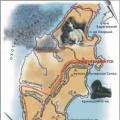 Makhorkin I.F. Discovery and exploration of Kamchatka. When and who discovered Kamchatka Discovery of Kamchatka
Makhorkin I.F. Discovery and exploration of Kamchatka. When and who discovered Kamchatka Discovery of Kamchatka A Star Wars spaceship and an old Superman costume were sold at auction in the United States
A Star Wars spaceship and an old Superman costume were sold at auction in the United States Zhdanov, Andrey Alexandrovich - brief biography You discussed with Zhdanov the cause of his wife’s death
Zhdanov, Andrey Alexandrovich - brief biography You discussed with Zhdanov the cause of his wife’s death